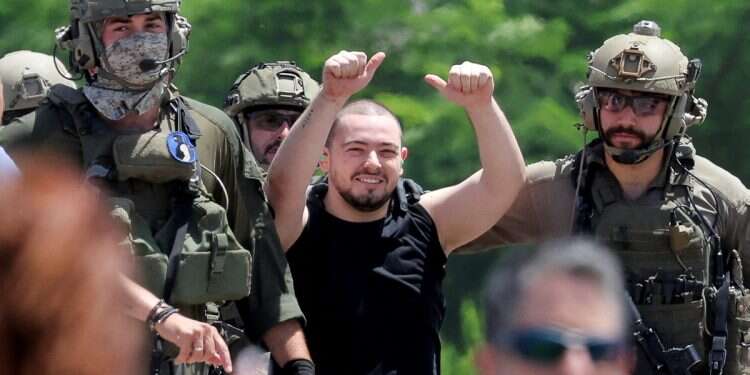As the civil year concludes, the Shin Bet security agency has published its comprehensive 2024 report detailing operations across all theaters – from Gaza, Lebanon, and Judea and Samaria, to Arab citizens of Israel, Iranian threats, technology, and wartime cybersecurity.
Gaza Operations
The war precipitated a fundamental shift in the Shin Bet's intelligence gathering and counter-terrorism strategy. After a long period of avoiding physical presence in Gaza territory, the organization revolutionized its operational approach during the southern ground campaign, implementing a "boots on the ground" strategy where Shin Bet coordinators and operatives now accompany IDF forces. Field personnel continue recruiting and running agents even during active combat, adapting their methodologies for operations within Gaza – a development unseen since the 2005 disengagement.
The enhanced ground presence has yielded significant results: over 1,350 tunnel-related arrests, including approximately 40 senior operatives and commanders, 165 close associates of high-ranking officials, 45 individuals linked to the October 7 attack, and 100 suspects with potential hostage-related intelligence.
A new southern theater interrogation division was established as the war began, specifically for processing detainees from Gaza ground operations. This unit has handled roughly 2,500 Gaza detainees, with more than 650 transferred for intensive Shin Bet interrogation. These interrogations generated crucial intelligence that saved lives during ground operations and enabled hundreds of precision strikes against terror infrastructure in Gaza. The agency developed a "from interrogation to target" system, converting real-time intelligence into actionable targets, resulting in hundreds of successful strikes based on interrogation-derived intelligence.

The interrogations provided IDF ground forces with vital tactical intelligence, including warnings about booby-trapped buildings and Hamas operational patterns. Critical intelligence gathered during questioning led to the recovery of nine hostage bodies, enabling their return to Israel for proper burial. The intelligence operation also mapped Hamas leadership's underground network and the Shifa Hospital complex before IDF-Shin Bet operations, significantly facilitating rapid tactical entry.
Counter-terrorism operations eliminated over 30 senior Hamas military wing figures in Gaza – including 6 brigade commanders, approximately 30 battalion commanders, command and control leadership, and hundreds of company-level commanders, all identified through precise intelligence and interrogations. Notable eliminations included organization leaders Yahya Sinwar and Mohammed Deif, along with senior figures like Marwan Issa and Ruhi Mushtaha.
Following the Oct. 7 massacre, the agency established the NILI operations center, dedicated to eliminating terrorists who participated in the attack on Israel, prioritizing operational closure. Throughout the year, joint operations with the IDF eliminated dozens of attack participants. Key eliminated leaders included Jihad Kahlout, who commanded the Mefalsim curve massacre and kidnappings; Muhammad Abu Attawi, who directed Route 232 shelter attacks near Reim; Majdi Akilan, who led the Nahal Oz massacre; and Ahmed Wadiya, who paraglided into Netiv HaAsara and orchestrated the village attack.
Lebanon Operations
The agency significantly intensified its Lebanon operations during the war, focusing on intelligence gathering and Hamas activity prevention through a specialized division established two years ago to counter threats from Hamas' international command centers. The Shin Bet actively counters Palestinian terror organizations' entrenchment in Lebanon, targeting operational handlers who direct attacks against Israel, including rocket launches and infiltration attempts. The year saw the elimination of 25 senior operatives from Palestinian terror groups in Lebanon, including Hamas, Al-Jamaa Al-Islamiya, and the Popular Front for the Liberation of Palestine. A notable operation was the Jan. 2 elimination of Saleh al-Arouri, Hamas political bureau deputy chief and Oct. 7 attack architect, in Beirut's Dahieh district.
Judea, Samaria and Jerusalem Activities
The agency thwarted 1,040 significant attacks throughout the year: 689 shooting attempts, 326 explosive device plots, 13 planned stabbings, 9 vehicle ramming attempts, two suicide bombing plots, and one kidnapping scheme. Despite increased prevention activities, attacks in these regions decreased by 40% compared to previous years.
The year saw dozens of joint special operations with IDF and Yamam forces, including 13 aerial strike operations and 10 ground-based arrest or prevention missions. Notable operations included sensitive missions at Jenin Hospital, Nablus, and a complex operation in Tulkarem refugee camp's center in late October.
Internal Security
The agency prioritized "internal arena containment" to maintain operational focus on Gaza and Lebanon fronts. Twenty terror cells comprising Israeli Arab citizens were exposed and neutralized, including five planning explosive or vehicle-based attacks. Investigations covered approximately 80 cases involving Arab citizens, including nine weapons-related incidents and 26 cases of ISIS-inspired activities or pledged allegiance. A concerning trend emerged with increased minor involvement in terrorism, leading to unprecedented administrative detentions of weapons traffickers to combat security-threatening criminal activities.
Special Operations and Hostage Recovery
The elite "Tequila" team, combining Shin Bet and Yamam operators, deployed 32 times for immediate threat response. Three successful hostage rescue operations were conducted: "Beginning of the Light" (Oct. 30, 2023, rescuing Ori Megidish), "Golden Hand" (Febr. 11, 2024, saving Louis Har and Fernando Marman), and "Operation Arnon" (June 8, 2024, recovering Shlomi Ziv, Andrey Kozlov, Noa Argamani, and Almog Meir Jan). Additional operations focused on recovering deceased hostages' remains.

Iranian Threats and Counter-Intelligence
Iranian threat activity intensified through multiple vectors, including attempts to smuggle advanced weapons to Judea and Samaria and recruit Israeli citizens. Arrests in Iranian espionage cases increased 400% from 2023. Thirteen major espionage networks were dismantled, with 37 Israelis investigated and 27 indicted. Intelligence estimates suggest dozens of Israelis maintained contact with Iranian handlers during the war, with hundreds more targeted for recruitment.
Security and Protection Operations
The agency conducted hundreds of complex security operations in high-risk areas, including protection details for officials visiting Gaza, Lebanon, and Syria. International security operations included protecting Israel's Olympic delegation in Paris and Eurovision representatives in Sweden.
Cybersecurity Front
Cyber attacks increased fivefold during the war. Joint efforts with IDF and the National Cyber Array thwarted approximately 700 attacks from thousands of attempted breaches. Attack distribution showed 66% aimed at intelligence gathering, 32% targeting infrastructure damage, and 2% focused on influence operations.




